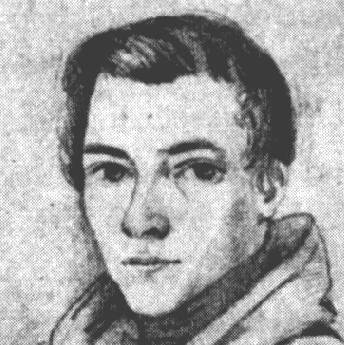Karl Wilhelm Feuerbach (1800-1834)
geometer
|
One of the most striking theorems in triangle geometry is Feuerbach's theorem, that the nine-point circle is tangent to the incircle and all three excircles. The point of tangency with the incircle is the Feuerbach point, and the three tangency points with the excircles form the Feuerbach triangle. For a figure, click on "Feuerbach point" at the end of this page.
Feuerbach was born to a distinguished German family, sufficiently many of whom exhibited both genius and mental illness for there to be a book on this subject (below).
The result now known as the Feuerbach theorem was published by Feuerbach in 1822 in his thin book Eigenschaften einiger merkwürdigen Punkte des geradlinigen Dreiecks und mehrerer durch sie bestimmten Linien und Figuren: Eine analytisch-trigonometrische Abhandlung (Properties of some special points in the plane of a triangle, and various lines and figures determined by these points: an analytic-trigonometric treatment). The title page indicates that the author had the Ph.D. degree; indeed, he had finished his formal education at the university in Freiburg, but there appears to be no record of his taking the Ph.D. at Freiburg, or elsewhere.
|

|
Feuerbach held mathematics positions at the Gymnasiums in Erlangen, and after a period of imprisonment, in Hof, and in 1828, after a relapse of his illness, again in Erlangen. After threatening his students with a sword, Feuerbach was permanently retired.
Aside from the 1822 book, Feuerbach also published, in 1827, Grundriss zu analytischen Untersuchungen der dreyeckigen Pyramide (Foundations of the analytic theory of the triangular pyramid). This work introduced homogeneous coordinates during the same year that Möbius introduced them. Regarding this subject, a leading twentieth-century mathematician, H. S. M. Coxeter, has written, "Möbius's invention of homogeneous coordinates was one of the most far-reaching ideas in the history of mathematics..."
For a closer look at Feuerbach's life and work, see
Dan Pedoe, Circles: A Mathematical View, Mathematical Association of America, 1995.
For more on the remarkable Feuerbach family, see
Theodor Spoerri, Genie und Krankheit: Eine psychopathologische Untersuchung der Familie Feuerbach, S. Karger, Basel, 1952
Feuerbach point
Clark Kimberling Home Page
